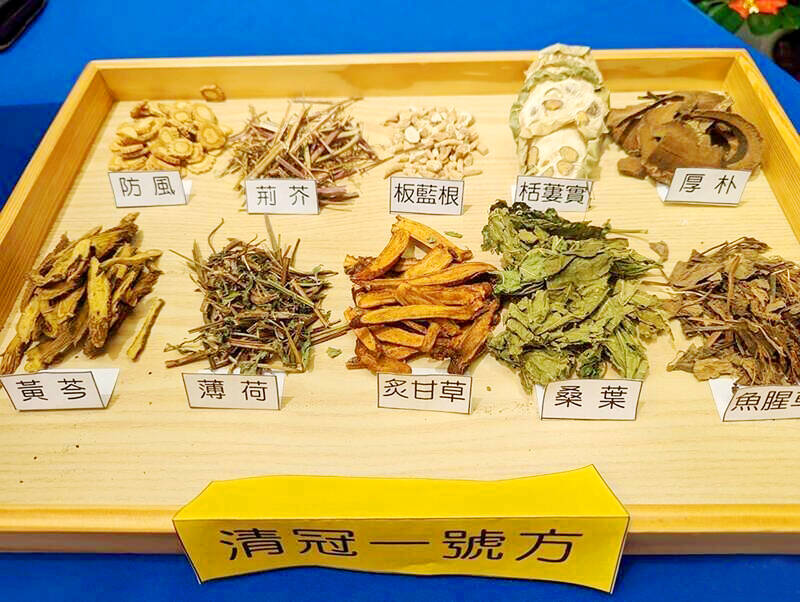Chingguan Yihau (清冠一號), a traditional Chinese medicine to treat COVID-19, will no longer be covered by government subsidies from Saturday next week.
The termination of the subsidies is due to the expiration of the Special Act for Prevention, Relief and Revitalization Measures for Severe Pneumonia with Novel Pathogens (嚴重特殊傳染性肺炎防治及紓困振興特別條例) on Friday next week.
From Saturday next week, the herbal formula developed in Taiwan, also called NRICM101, will only be available to people who obtain a prescription and pay out-of-pocket.

Photo: Taipei Times
As of Monday last week, about 1.71 million people, or 17 percent of people who had contracted COVID-19, had taken Chingguan Yihau subsidized by the government, the Ministry of Health and Welfare’s Department of Chinese Medicine and Pharmacy said.
Priced at about NT$1,500 per box, the treatments cost the country about NT$2.5 billion, it said.
Of the 12 pharmaceutical companies that had obtained emergency use authorization (EUA) to manufacture the drug, only Shuntiantang and Tian Yi are willing to apply for a formal pharmaceutical permit once the EUA expires in June next year, the ministry said.
Shuntiantang and Tian Yi are to work separately with Linkou Changgung Memorial Hospital and the China Medical University Affiliated Hospital; and the Department of Chinese Medicine and Pharmacy will offer subsidies of NT$2.5 million to NT$3 million (US$80,853 to US$97,025) to help them in conducting phase 3 clinical trials.
Minister of Health and Welfare Hsueh Jui-yuan (薛瑞元) yesterday said while Chingguan Yihau is considered a supplement overseas, it is a prescription drug in Taiwan.
Purchasing the drug from overseas platforms by unlicensed individuals for resell at a higher price in Taiwan would be in contravention of the Pharmaceutical Affairs Act (藥事法), he said.
Meanwhile, former Department of Health minister Yaung Chih-liang (楊志良) said that although the worst of the COVID-19 pandemic is over, people are still contracting the disease.
Whether the government should continue subsidizing treatments is worth discussing, he said, adding: “The government isn’t that short on cash.”
Hsueh said he “was not sure where Yaung was coming from” with his comments, as the legal basis for the funds is coming to a close.
Furthermore, the government’s allotted budget for NRICM101 subsidies has been used up, he said.

Chinese Nationalist Party (KMT) Chairman Eric Chu (朱立倫), spokeswoman Yang Chih-yu (楊智伃) and Legislator Hsieh Lung-chieh (謝龍介) would be summoned by police for questioning for leading an illegal assembly on Thursday evening last week, Minister of the Interior Liu Shyh-fang (劉世芳) said today. The three KMT officials led an assembly outside the Taipei City Prosecutors’ Office, a restricted area where public assembly is not allowed, protesting the questioning of several KMT staff and searches of KMT headquarters and offices in a recall petition forgery case. Chu, Yang and Hsieh are all suspected of contravening the Assembly and Parade Act (集會遊行法) by holding

PRAISE: Japanese visitor Takashi Kubota said the Taiwanese temple architecture images showcased in the AI Art Gallery were the most impressive displays he saw Taiwan does not have an official pavilion at the World Expo in Osaka, Japan, because of its diplomatic predicament, but the government-backed Tech World pavilion is drawing interest with its unique recreations of works by Taiwanese artists. The pavilion features an artificial intelligence (AI)-based art gallery showcasing works of famous Taiwanese artists from the Japanese colonial period using innovative technologies. Among its main simulated displays are Eastern gouache paintings by Chen Chin (陳進), Lin Yu-shan (林玉山) and Kuo Hsueh-hu (郭雪湖), who were the three young Taiwanese painters selected for the East Asian Painting exhibition in 1927. Gouache is a water-based

Taiwan would welcome the return of Honduras as a diplomatic ally if its next president decides to make such a move, Minister of Foreign Affairs Lin Chia-lung (林佳龍) said yesterday. “Of course, we would welcome Honduras if they want to restore diplomatic ties with Taiwan after their elections,” Lin said at a meeting of the legislature’s Foreign Affairs and National Defense Committee, when asked to comment on statements made by two of the three Honduran presidential candidates during the presidential campaign in the Central American country. Taiwan is paying close attention to the region as a whole in the wake of a

OFF-TARGET: More than 30,000 participants were expected to take part in the Games next month, but only 6,550 foreign and 19,400 Taiwanese athletes have registered Taipei city councilors yesterday blasted the organizers of next month’s World Masters Games over sudden timetable and venue changes, which they said have caused thousands of participants to back out of the international sporting event, among other organizational issues. They also cited visa delays and political interference by China as reasons many foreign athletes are requesting refunds for the event, to be held from May 17 to 30. Jointly organized by the Taipei and New Taipei City governments, the games have been rocked by numerous controversies since preparations began in 2020. Taipei City Councilor Lin Yen-feng (林延鳳) said yesterday that new measures by